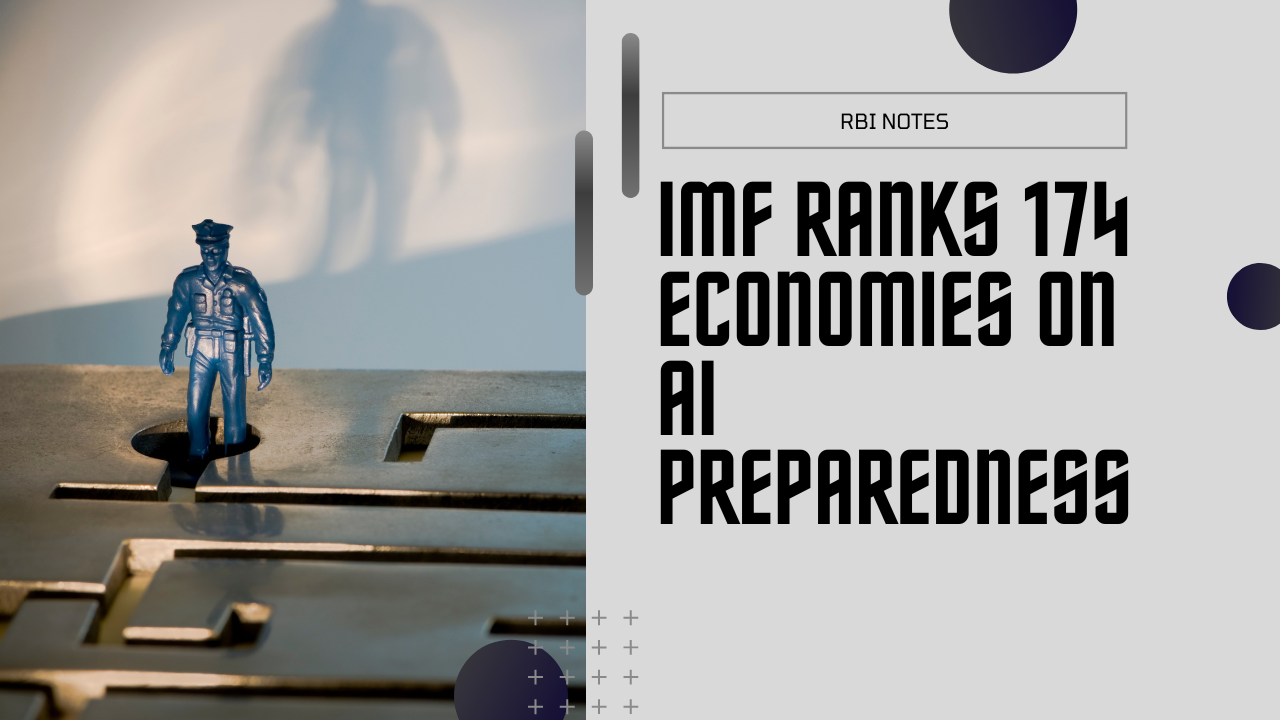The International Monetary Fund (IMF) has unveiled its Artificial Intelligence Preparedness Index (AIPI) on June 25, 2024. This index tracks 174 economies globally, assessing their readiness to harness the potential of AI. The index provides crucial insights into how prepared different nations are to integrate AI into their economies, reflecting on their digital infrastructure, human capital, innovation, labor policies, integration, and regulation.
India’s Position and Regional Context
- India’s Ranking: India is ranked 72nd in the index, with a score of 0.49, placing it in the category of Emerging Market Economies (EM).
- Neighboring Countries: Bangladesh ranks 113th with a score of 0.38, Sri Lanka stands at 92nd with a score of 0.43, and China is notably ahead at 31st with a score of 0.63.
Top Performers in the Index
- Highest-Ranked Economies: Singapore leads with a score of 0.80, followed by Denmark at 0.78, and the United States at 0.77. These countries are classified as Advanced Economies (AE).
Analysis of the AI Preparedness Index
The index’s rating for each country is based on several critical factors:
- Digital Infrastructure: The availability and quality of digital infrastructure that supports AI development.
- Human Capital: The availability of skilled labor and educational resources to foster AI innovation.
- Labor Policies: The adaptability of labor policies to the changing demands posed by AI.
- Innovation and Integration: The level of innovation and how well AI is integrated into various sectors.
- Regulation: The regulatory environment that governs AI deployment and usage.
Economic Impact of AI
The IMF’s report outlines the profound impact AI is expected to have on different economies:
- Advanced Economies: AI could endanger up to 33% of jobs, yet it also presents an opportunity to enhance productivity and create new industries.
- Emerging Market Economies (EM) and Low-Income Countries (LIC): These economies may be less immediately affected by AI due to their lower share of high-skilled jobs. However, the lack of infrastructure and skilled workforce could exacerbate inequalities, making it harder for these countries to benefit from AI advancements.
Addressing Inequality
AI is likely to worsen global inequality unless proactive measures are taken by policymakers. The IMF recommends expanding social safety nets, investing in worker training, and prioritizing innovation and regulation to protect against AI’s potential risks.
India’s AI Initiative: IndiaAI Mission
To bolster its position in the AI landscape, India has launched the IndiaAI Mission. This national program aims to democratize AI innovation and ensure the global competitiveness of India’s AI startups and researchers. The mission focuses on developing a robust AI ecosystem through strategic programs, partnerships across public and private sectors, and initiatives like improving data quality, fostering indigenous AI capabilities, and enabling industry collaboration.
The mission is implemented by the IndiaAI Independent Business Division (IBD) under the Digital India Corporation (DIC), with key components including:
- IndiaAI Compute Capacity
- IndiaAI Innovation Centre
- IndiaAI Datasets Platform
- IndiaAI Application Development Initiative
- IndiaAI FutureSkills
- IndiaAI Startup Financing
- Safe & Trusted AI
Way Forward
The IMF urges policymakers, especially in advanced economies, to expand social safety nets, invest in AI-related training, and strengthen global regulations to manage AI’s impact effectively. For India, the focus remains on accelerating the development of its AI ecosystem while ensuring inclusive growth and mitigating potential risks associated with AI deployment.
This comprehensive approach underscores the need for coordinated global efforts to harness AI’s benefits while addressing the challenges it poses, particularly in terms of job displacement and inequality.


